Entrepreneurial Self-Efficacy: A Systematic Review and Qualitative Interview Analysis
VerifiedAdded on 2023/06/15
|10
|2955
|344
AI Summary
This article provides a systematic review of literature on Entrepreneurial Self-Efficacy (ESE) and qualitative interview analysis of a young entrepreneur. It covers theoretical foundations, antecedents, outcomes, and future research agenda. The article also discusses the rationale for using qualitative interviews, data analysis method, and findings analysis.
Contribute Materials
Your contribution can guide someone’s learning journey. Share your
documents today.

Research
Secure Best Marks with AI Grader
Need help grading? Try our AI Grader for instant feedback on your assignments.
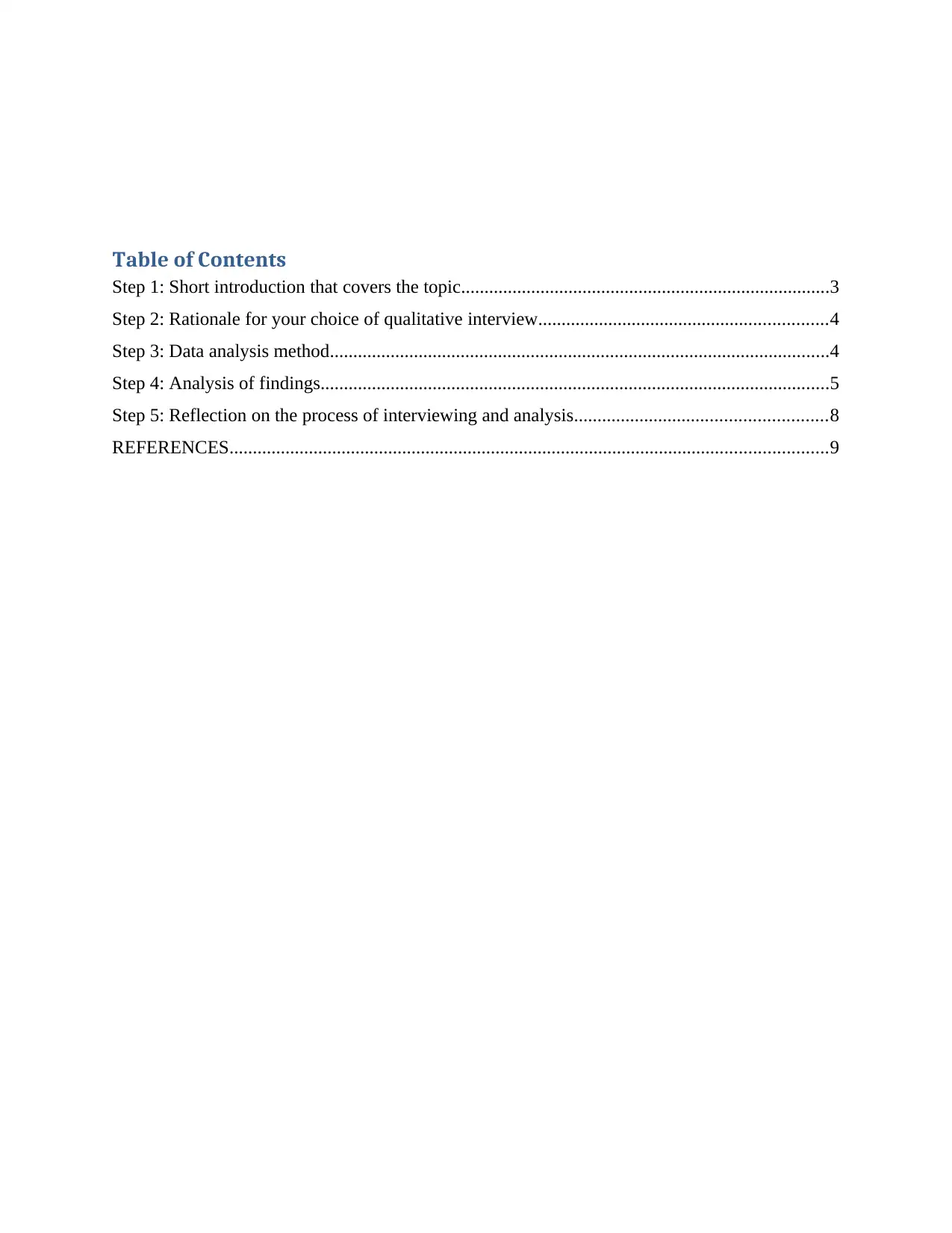
Table of Contents
Step 1: Short introduction that covers the topic...............................................................................3
Step 2: Rationale for your choice of qualitative interview..............................................................4
Step 3: Data analysis method...........................................................................................................4
Step 4: Analysis of findings.............................................................................................................5
Step 5: Reflection on the process of interviewing and analysis......................................................8
REFERENCES................................................................................................................................9
Step 1: Short introduction that covers the topic...............................................................................3
Step 2: Rationale for your choice of qualitative interview..............................................................4
Step 3: Data analysis method...........................................................................................................4
Step 4: Analysis of findings.............................................................................................................5
Step 5: Reflection on the process of interviewing and analysis......................................................8
REFERENCES................................................................................................................................9
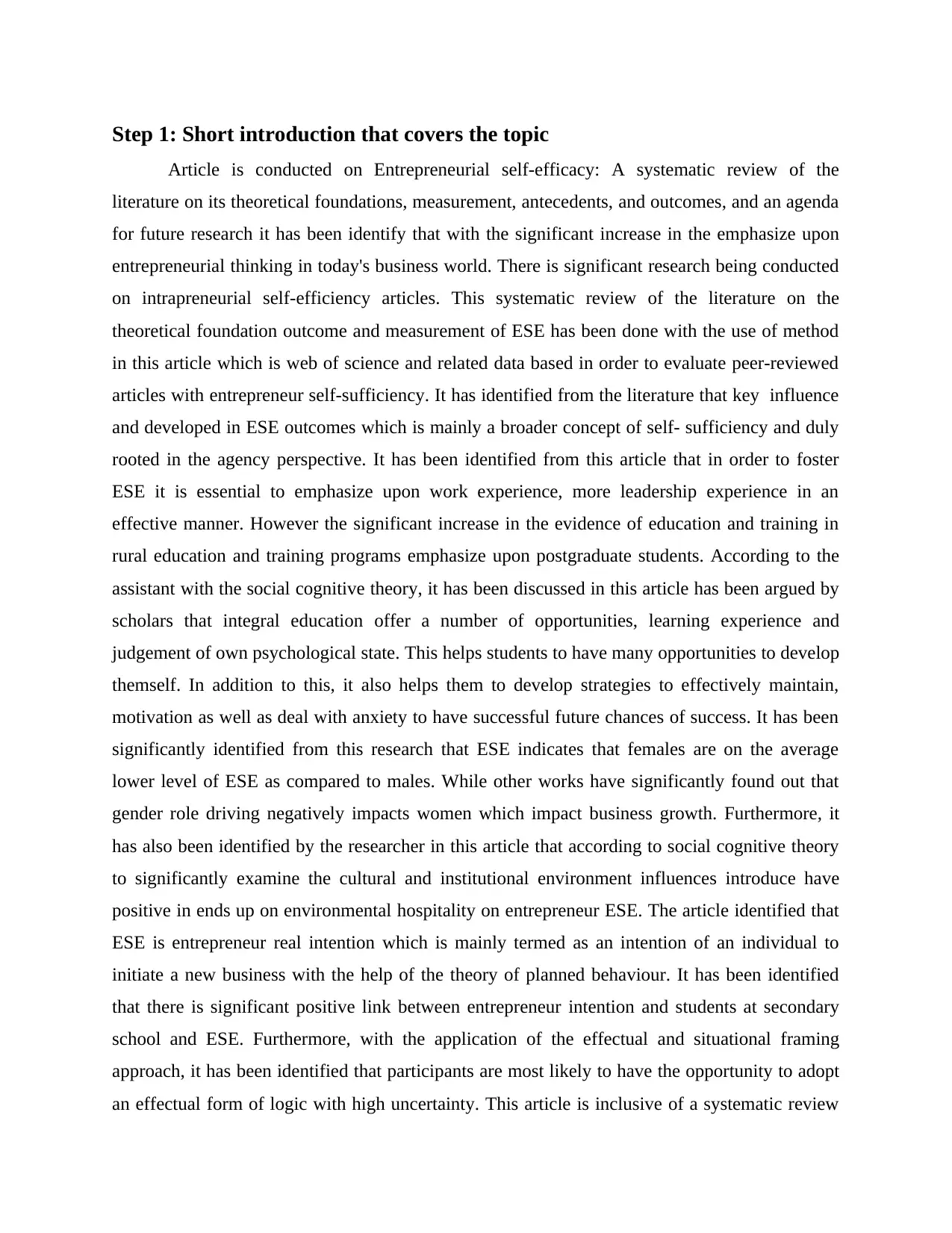
Step 1: Short introduction that covers the topic
Article is conducted on Entrepreneurial self-efficacy: A systematic review of the
literature on its theoretical foundations, measurement, antecedents, and outcomes, and an agenda
for future research it has been identify that with the significant increase in the emphasize upon
entrepreneurial thinking in today's business world. There is significant research being conducted
on intrapreneurial self-efficiency articles. This systematic review of the literature on the
theoretical foundation outcome and measurement of ESE has been done with the use of method
in this article which is web of science and related data based in order to evaluate peer-reviewed
articles with entrepreneur self-sufficiency. It has identified from the literature that key influence
and developed in ESE outcomes which is mainly a broader concept of self- sufficiency and duly
rooted in the agency perspective. It has been identified from this article that in order to foster
ESE it is essential to emphasize upon work experience, more leadership experience in an
effective manner. However the significant increase in the evidence of education and training in
rural education and training programs emphasize upon postgraduate students. According to the
assistant with the social cognitive theory, it has been discussed in this article has been argued by
scholars that integral education offer a number of opportunities, learning experience and
judgement of own psychological state. This helps students to have many opportunities to develop
themself. In addition to this, it also helps them to develop strategies to effectively maintain,
motivation as well as deal with anxiety to have successful future chances of success. It has been
significantly identified from this research that ESE indicates that females are on the average
lower level of ESE as compared to males. While other works have significantly found out that
gender role driving negatively impacts women which impact business growth. Furthermore, it
has also been identified by the researcher in this article that according to social cognitive theory
to significantly examine the cultural and institutional environment influences introduce have
positive in ends up on environmental hospitality on entrepreneur ESE. The article identified that
ESE is entrepreneur real intention which is mainly termed as an intention of an individual to
initiate a new business with the help of the theory of planned behaviour. It has been identified
that there is significant positive link between entrepreneur intention and students at secondary
school and ESE. Furthermore, with the application of the effectual and situational framing
approach, it has been identified that participants are most likely to have the opportunity to adopt
an effectual form of logic with high uncertainty. This article is inclusive of a systematic review
Article is conducted on Entrepreneurial self-efficacy: A systematic review of the
literature on its theoretical foundations, measurement, antecedents, and outcomes, and an agenda
for future research it has been identify that with the significant increase in the emphasize upon
entrepreneurial thinking in today's business world. There is significant research being conducted
on intrapreneurial self-efficiency articles. This systematic review of the literature on the
theoretical foundation outcome and measurement of ESE has been done with the use of method
in this article which is web of science and related data based in order to evaluate peer-reviewed
articles with entrepreneur self-sufficiency. It has identified from the literature that key influence
and developed in ESE outcomes which is mainly a broader concept of self- sufficiency and duly
rooted in the agency perspective. It has been identified from this article that in order to foster
ESE it is essential to emphasize upon work experience, more leadership experience in an
effective manner. However the significant increase in the evidence of education and training in
rural education and training programs emphasize upon postgraduate students. According to the
assistant with the social cognitive theory, it has been discussed in this article has been argued by
scholars that integral education offer a number of opportunities, learning experience and
judgement of own psychological state. This helps students to have many opportunities to develop
themself. In addition to this, it also helps them to develop strategies to effectively maintain,
motivation as well as deal with anxiety to have successful future chances of success. It has been
significantly identified from this research that ESE indicates that females are on the average
lower level of ESE as compared to males. While other works have significantly found out that
gender role driving negatively impacts women which impact business growth. Furthermore, it
has also been identified by the researcher in this article that according to social cognitive theory
to significantly examine the cultural and institutional environment influences introduce have
positive in ends up on environmental hospitality on entrepreneur ESE. The article identified that
ESE is entrepreneur real intention which is mainly termed as an intention of an individual to
initiate a new business with the help of the theory of planned behaviour. It has been identified
that there is significant positive link between entrepreneur intention and students at secondary
school and ESE. Furthermore, with the application of the effectual and situational framing
approach, it has been identified that participants are most likely to have the opportunity to adopt
an effectual form of logic with high uncertainty. This article is inclusive of a systematic review
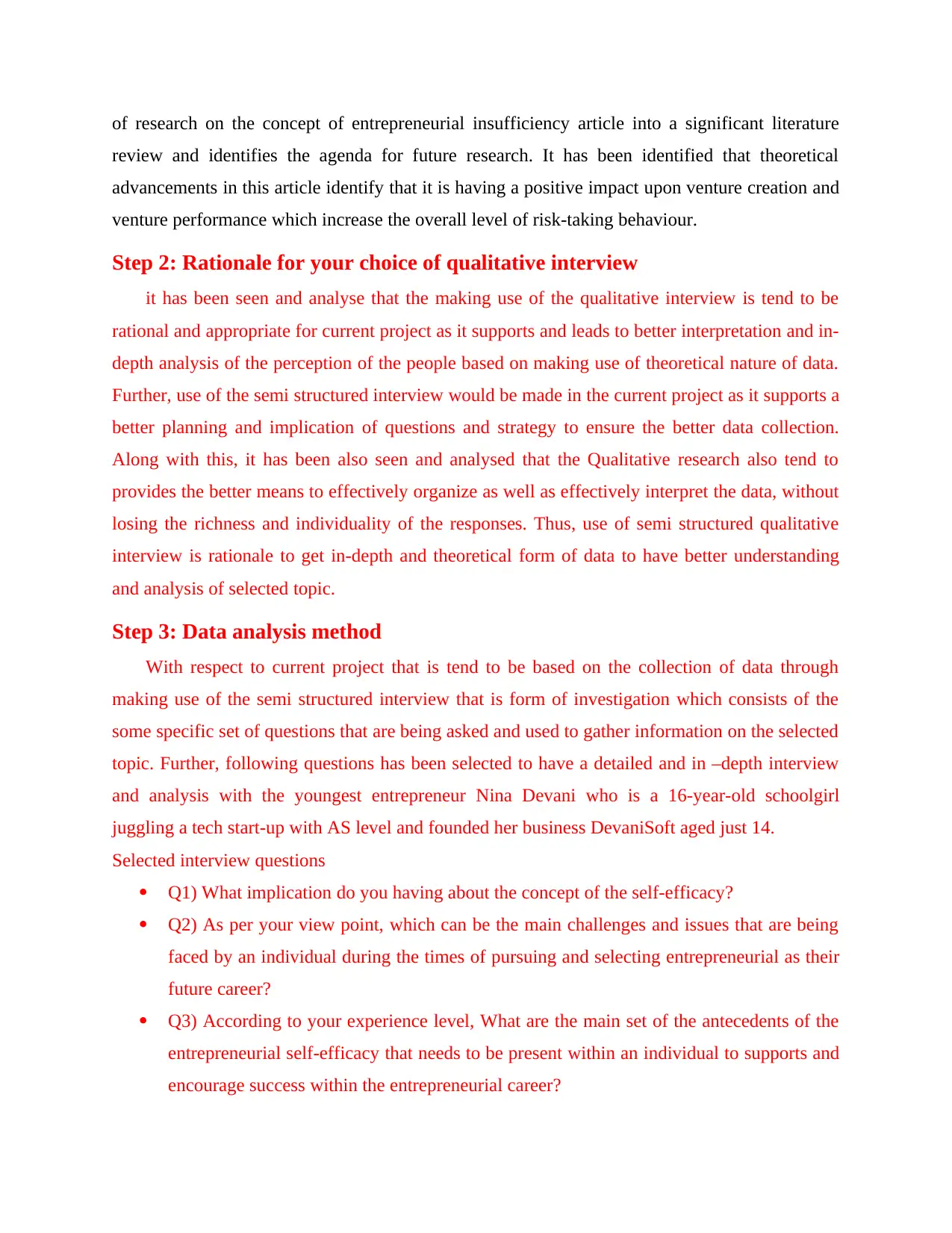
of research on the concept of entrepreneurial insufficiency article into a significant literature
review and identifies the agenda for future research. It has been identified that theoretical
advancements in this article identify that it is having a positive impact upon venture creation and
venture performance which increase the overall level of risk-taking behaviour.
Step 2: Rationale for your choice of qualitative interview
it has been seen and analyse that the making use of the qualitative interview is tend to be
rational and appropriate for current project as it supports and leads to better interpretation and in-
depth analysis of the perception of the people based on making use of theoretical nature of data.
Further, use of the semi structured interview would be made in the current project as it supports a
better planning and implication of questions and strategy to ensure the better data collection.
Along with this, it has been also seen and analysed that the Qualitative research also tend to
provides the better means to effectively organize as well as effectively interpret the data, without
losing the richness and individuality of the responses. Thus, use of semi structured qualitative
interview is rationale to get in-depth and theoretical form of data to have better understanding
and analysis of selected topic.
Step 3: Data analysis method
With respect to current project that is tend to be based on the collection of data through
making use of the semi structured interview that is form of investigation which consists of the
some specific set of questions that are being asked and used to gather information on the selected
topic. Further, following questions has been selected to have a detailed and in –depth interview
and analysis with the youngest entrepreneur Nina Devani who is a 16-year-old schoolgirl
juggling a tech start-up with AS level and founded her business DevaniSoft aged just 14.
Selected interview questions
Q1) What implication do you having about the concept of the self-efficacy?
Q2) As per your view point, which can be the main challenges and issues that are being
faced by an individual during the times of pursuing and selecting entrepreneurial as their
future career?
Q3) According to your experience level, What are the main set of the antecedents of the
entrepreneurial self-efficacy that needs to be present within an individual to supports and
encourage success within the entrepreneurial career?
review and identifies the agenda for future research. It has been identified that theoretical
advancements in this article identify that it is having a positive impact upon venture creation and
venture performance which increase the overall level of risk-taking behaviour.
Step 2: Rationale for your choice of qualitative interview
it has been seen and analyse that the making use of the qualitative interview is tend to be
rational and appropriate for current project as it supports and leads to better interpretation and in-
depth analysis of the perception of the people based on making use of theoretical nature of data.
Further, use of the semi structured interview would be made in the current project as it supports a
better planning and implication of questions and strategy to ensure the better data collection.
Along with this, it has been also seen and analysed that the Qualitative research also tend to
provides the better means to effectively organize as well as effectively interpret the data, without
losing the richness and individuality of the responses. Thus, use of semi structured qualitative
interview is rationale to get in-depth and theoretical form of data to have better understanding
and analysis of selected topic.
Step 3: Data analysis method
With respect to current project that is tend to be based on the collection of data through
making use of the semi structured interview that is form of investigation which consists of the
some specific set of questions that are being asked and used to gather information on the selected
topic. Further, following questions has been selected to have a detailed and in –depth interview
and analysis with the youngest entrepreneur Nina Devani who is a 16-year-old schoolgirl
juggling a tech start-up with AS level and founded her business DevaniSoft aged just 14.
Selected interview questions
Q1) What implication do you having about the concept of the self-efficacy?
Q2) As per your view point, which can be the main challenges and issues that are being
faced by an individual during the times of pursuing and selecting entrepreneurial as their
future career?
Q3) According to your experience level, What are the main set of the antecedents of the
entrepreneurial self-efficacy that needs to be present within an individual to supports and
encourage success within the entrepreneurial career?
Secure Best Marks with AI Grader
Need help grading? Try our AI Grader for instant feedback on your assignments.

Q4) What prompted you to create your concept of DevaniSoft?
Q5) As per your opinion what are the key factors that supported you to become the
Youngest entrepreneur at the age of 14?
Q6) What are the main challenges and threats that are being faced by you while creating
and coming up with your business idea?
Q7) What steps do you take to keep yourself motivated?
Further, it has been seen and analysed that the concept of the data analysis tend to
comprises and includes of the process of collecting, modeling, and analyzing data to extract
insights that support decision-making. There are several methods and techniques to perform
analysis depending on the industry and the aim of the investigation. For the analysis of the data
collected with the help of above stated interview questions use of the thematic analysis has been
made that tend to ensures a significant way of the reviewing and analysing the qualitative form
of the data. It has been seen that the use of the thematic analysis of the qualitative method
researcher tend to have a close and better examination of the raw data collected in theoretical
manner based in common set of meanings. Beside this, the key steps that are being involved in
thematic analysis comprises of the having of the transcription along with the familiarization and
searching for the themes together with defining as well as naming the themes to effectively
finalising the analysis. Along with this, the thematic nature of the analysis is tend to be important
and rationale to support
Step 4: Analysis of findings
The analysis of the current qualitative interview is based on use of interpretation of the
themes that has been provided and discussed as below:
Theme 1: understanding do you having about the concept of the self-efficacy
Interpretation
On the basis of the current interview it has been seen and find out that the concept of the
entrepreneurial self-efficacy is tend to be a vital and important concept that is seemed to be
related and associated with the way an individual have and uses its self-ability to become and
grow as a successful entrepreneur. Thus, the concept of the self efficacy tend to present and
reflect about the extent to which an individual feel confident and have required skill to become a
Q5) As per your opinion what are the key factors that supported you to become the
Youngest entrepreneur at the age of 14?
Q6) What are the main challenges and threats that are being faced by you while creating
and coming up with your business idea?
Q7) What steps do you take to keep yourself motivated?
Further, it has been seen and analysed that the concept of the data analysis tend to
comprises and includes of the process of collecting, modeling, and analyzing data to extract
insights that support decision-making. There are several methods and techniques to perform
analysis depending on the industry and the aim of the investigation. For the analysis of the data
collected with the help of above stated interview questions use of the thematic analysis has been
made that tend to ensures a significant way of the reviewing and analysing the qualitative form
of the data. It has been seen that the use of the thematic analysis of the qualitative method
researcher tend to have a close and better examination of the raw data collected in theoretical
manner based in common set of meanings. Beside this, the key steps that are being involved in
thematic analysis comprises of the having of the transcription along with the familiarization and
searching for the themes together with defining as well as naming the themes to effectively
finalising the analysis. Along with this, the thematic nature of the analysis is tend to be important
and rationale to support
Step 4: Analysis of findings
The analysis of the current qualitative interview is based on use of interpretation of the
themes that has been provided and discussed as below:
Theme 1: understanding do you having about the concept of the self-efficacy
Interpretation
On the basis of the current interview it has been seen and find out that the concept of the
entrepreneurial self-efficacy is tend to be a vital and important concept that is seemed to be
related and associated with the way an individual have and uses its self-ability to become and
grow as a successful entrepreneur. Thus, the concept of the self efficacy tend to present and
reflect about the extent to which an individual feel confident and have required skill to become a
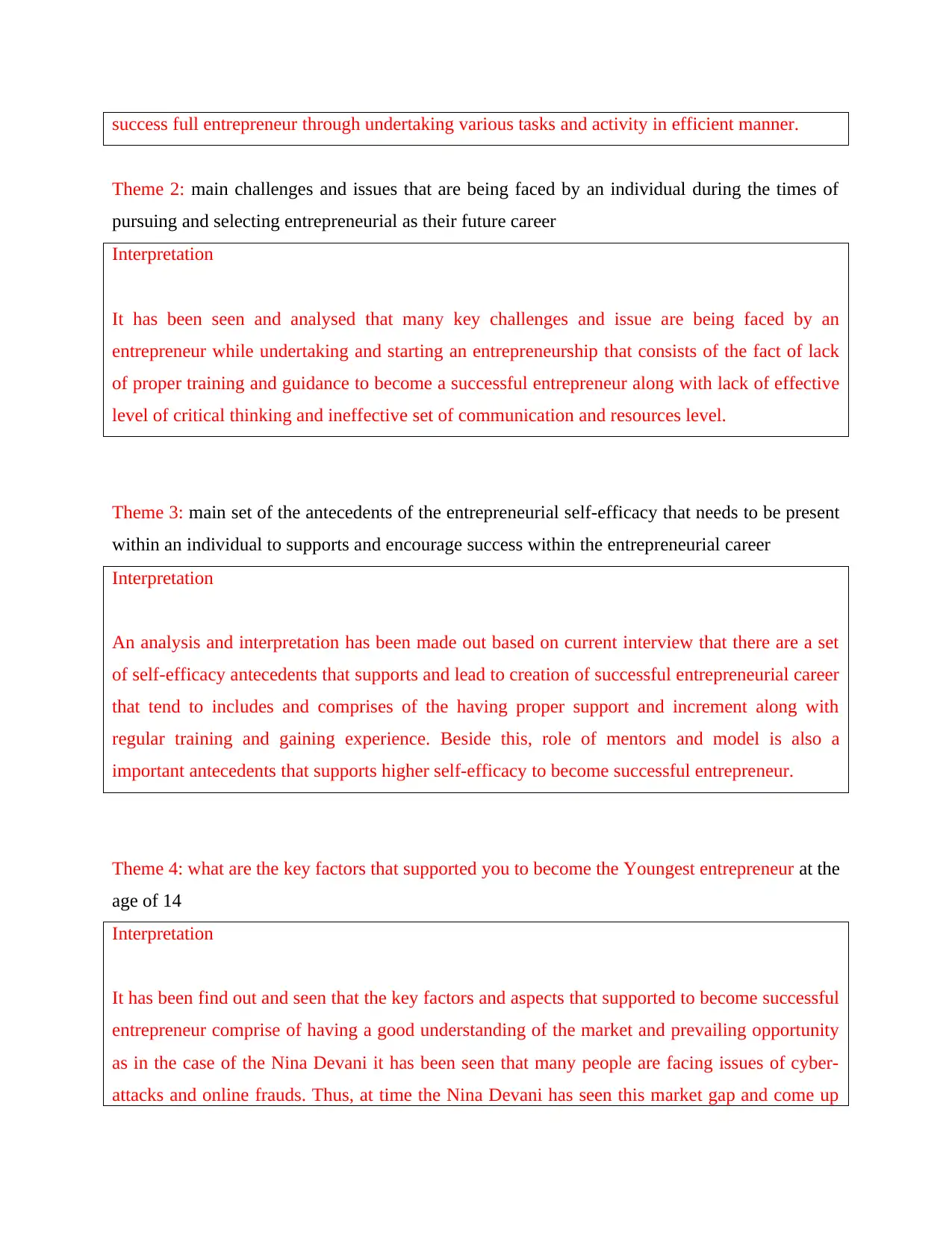
success full entrepreneur through undertaking various tasks and activity in efficient manner.
Theme 2: main challenges and issues that are being faced by an individual during the times of
pursuing and selecting entrepreneurial as their future career
Interpretation
It has been seen and analysed that many key challenges and issue are being faced by an
entrepreneur while undertaking and starting an entrepreneurship that consists of the fact of lack
of proper training and guidance to become a successful entrepreneur along with lack of effective
level of critical thinking and ineffective set of communication and resources level.
Theme 3: main set of the antecedents of the entrepreneurial self-efficacy that needs to be present
within an individual to supports and encourage success within the entrepreneurial career
Interpretation
An analysis and interpretation has been made out based on current interview that there are a set
of self-efficacy antecedents that supports and lead to creation of successful entrepreneurial career
that tend to includes and comprises of the having proper support and increment along with
regular training and gaining experience. Beside this, role of mentors and model is also a
important antecedents that supports higher self-efficacy to become successful entrepreneur.
Theme 4: what are the key factors that supported you to become the Youngest entrepreneur at the
age of 14
Interpretation
It has been find out and seen that the key factors and aspects that supported to become successful
entrepreneur comprise of having a good understanding of the market and prevailing opportunity
as in the case of the Nina Devani it has been seen that many people are facing issues of cyber-
attacks and online frauds. Thus, at time the Nina Devani has seen this market gap and come up
Theme 2: main challenges and issues that are being faced by an individual during the times of
pursuing and selecting entrepreneurial as their future career
Interpretation
It has been seen and analysed that many key challenges and issue are being faced by an
entrepreneur while undertaking and starting an entrepreneurship that consists of the fact of lack
of proper training and guidance to become a successful entrepreneur along with lack of effective
level of critical thinking and ineffective set of communication and resources level.
Theme 3: main set of the antecedents of the entrepreneurial self-efficacy that needs to be present
within an individual to supports and encourage success within the entrepreneurial career
Interpretation
An analysis and interpretation has been made out based on current interview that there are a set
of self-efficacy antecedents that supports and lead to creation of successful entrepreneurial career
that tend to includes and comprises of the having proper support and increment along with
regular training and gaining experience. Beside this, role of mentors and model is also a
important antecedents that supports higher self-efficacy to become successful entrepreneur.
Theme 4: what are the key factors that supported you to become the Youngest entrepreneur at the
age of 14
Interpretation
It has been find out and seen that the key factors and aspects that supported to become successful
entrepreneur comprise of having a good understanding of the market and prevailing opportunity
as in the case of the Nina Devani it has been seen that many people are facing issues of cyber-
attacks and online frauds. Thus, at time the Nina Devani has seen this market gap and come up
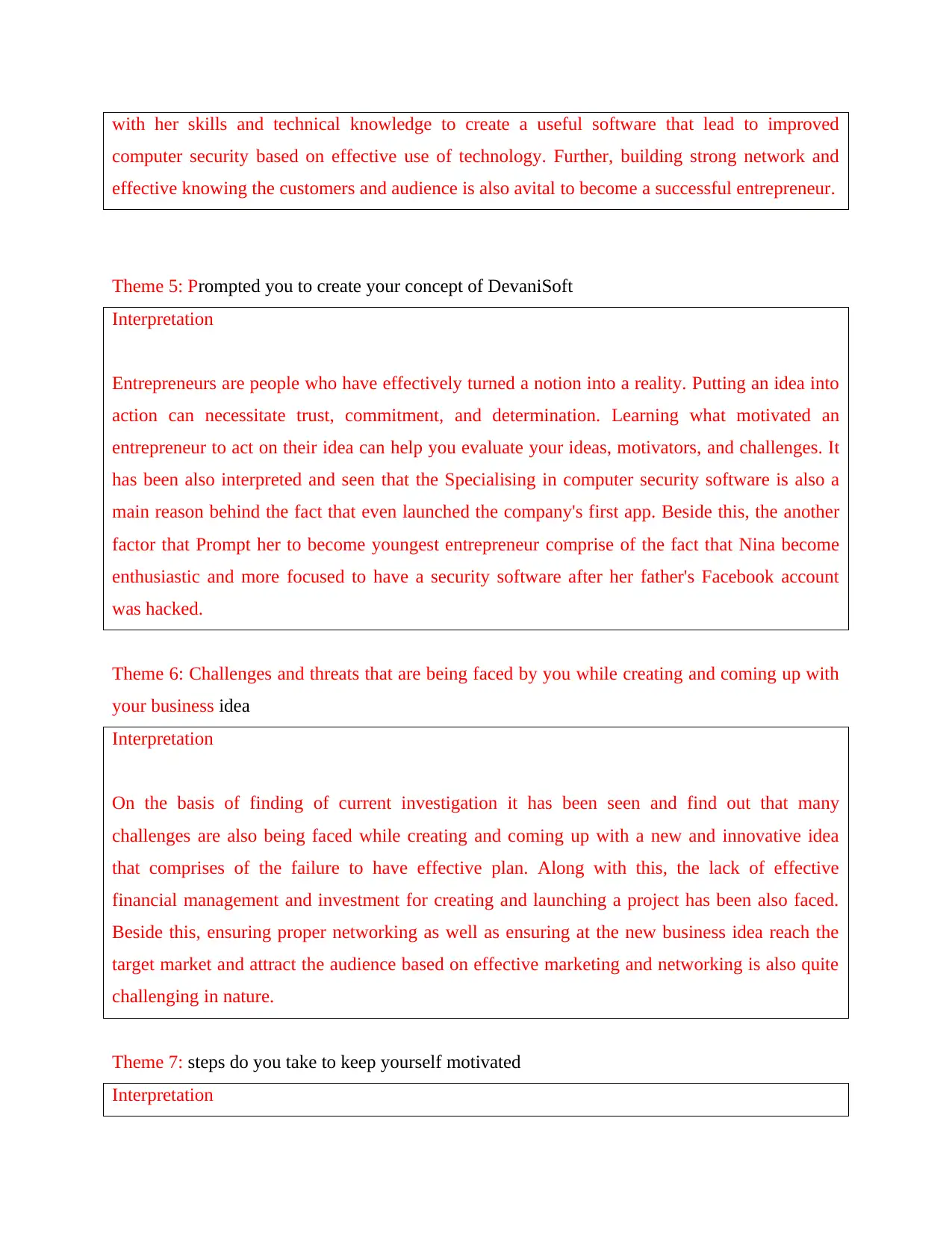
with her skills and technical knowledge to create a useful software that lead to improved
computer security based on effective use of technology. Further, building strong network and
effective knowing the customers and audience is also avital to become a successful entrepreneur.
Theme 5: Prompted you to create your concept of DevaniSoft
Interpretation
Entrepreneurs are people who have effectively turned a notion into a reality. Putting an idea into
action can necessitate trust, commitment, and determination. Learning what motivated an
entrepreneur to act on their idea can help you evaluate your ideas, motivators, and challenges. It
has been also interpreted and seen that the Specialising in computer security software is also a
main reason behind the fact that even launched the company's first app. Beside this, the another
factor that Prompt her to become youngest entrepreneur comprise of the fact that Nina become
enthusiastic and more focused to have a security software after her father's Facebook account
was hacked.
Theme 6: Challenges and threats that are being faced by you while creating and coming up with
your business idea
Interpretation
On the basis of finding of current investigation it has been seen and find out that many
challenges are also being faced while creating and coming up with a new and innovative idea
that comprises of the failure to have effective plan. Along with this, the lack of effective
financial management and investment for creating and launching a project has been also faced.
Beside this, ensuring proper networking as well as ensuring at the new business idea reach the
target market and attract the audience based on effective marketing and networking is also quite
challenging in nature.
Theme 7: steps do you take to keep yourself motivated
Interpretation
computer security based on effective use of technology. Further, building strong network and
effective knowing the customers and audience is also avital to become a successful entrepreneur.
Theme 5: Prompted you to create your concept of DevaniSoft
Interpretation
Entrepreneurs are people who have effectively turned a notion into a reality. Putting an idea into
action can necessitate trust, commitment, and determination. Learning what motivated an
entrepreneur to act on their idea can help you evaluate your ideas, motivators, and challenges. It
has been also interpreted and seen that the Specialising in computer security software is also a
main reason behind the fact that even launched the company's first app. Beside this, the another
factor that Prompt her to become youngest entrepreneur comprise of the fact that Nina become
enthusiastic and more focused to have a security software after her father's Facebook account
was hacked.
Theme 6: Challenges and threats that are being faced by you while creating and coming up with
your business idea
Interpretation
On the basis of finding of current investigation it has been seen and find out that many
challenges are also being faced while creating and coming up with a new and innovative idea
that comprises of the failure to have effective plan. Along with this, the lack of effective
financial management and investment for creating and launching a project has been also faced.
Beside this, ensuring proper networking as well as ensuring at the new business idea reach the
target market and attract the audience based on effective marketing and networking is also quite
challenging in nature.
Theme 7: steps do you take to keep yourself motivated
Interpretation
Paraphrase This Document
Need a fresh take? Get an instant paraphrase of this document with our AI Paraphraser
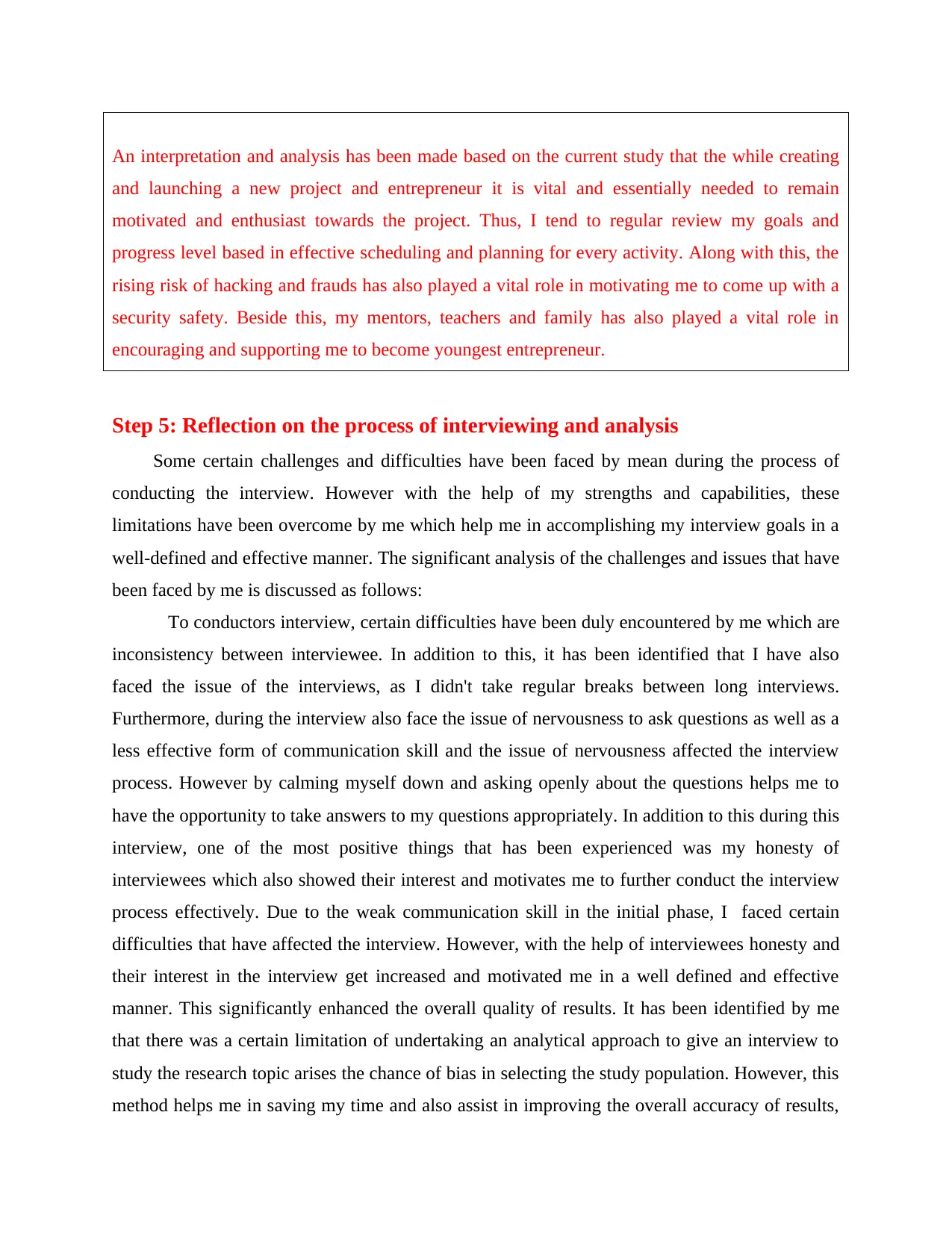
An interpretation and analysis has been made based on the current study that the while creating
and launching a new project and entrepreneur it is vital and essentially needed to remain
motivated and enthusiast towards the project. Thus, I tend to regular review my goals and
progress level based in effective scheduling and planning for every activity. Along with this, the
rising risk of hacking and frauds has also played a vital role in motivating me to come up with a
security safety. Beside this, my mentors, teachers and family has also played a vital role in
encouraging and supporting me to become youngest entrepreneur.
Step 5: Reflection on the process of interviewing and analysis
Some certain challenges and difficulties have been faced by mean during the process of
conducting the interview. However with the help of my strengths and capabilities, these
limitations have been overcome by me which help me in accomplishing my interview goals in a
well-defined and effective manner. The significant analysis of the challenges and issues that have
been faced by me is discussed as follows:
To conductors interview, certain difficulties have been duly encountered by me which are
inconsistency between interviewee. In addition to this, it has been identified that I have also
faced the issue of the interviews, as I didn't take regular breaks between long interviews.
Furthermore, during the interview also face the issue of nervousness to ask questions as well as a
less effective form of communication skill and the issue of nervousness affected the interview
process. However by calming myself down and asking openly about the questions helps me to
have the opportunity to take answers to my questions appropriately. In addition to this during this
interview, one of the most positive things that has been experienced was my honesty of
interviewees which also showed their interest and motivates me to further conduct the interview
process effectively. Due to the weak communication skill in the initial phase, I faced certain
difficulties that have affected the interview. However, with the help of interviewees honesty and
their interest in the interview get increased and motivated me in a well defined and effective
manner. This significantly enhanced the overall quality of results. It has been identified by me
that there was a certain limitation of undertaking an analytical approach to give an interview to
study the research topic arises the chance of bias in selecting the study population. However, this
method helps me in saving my time and also assist in improving the overall accuracy of results,
and launching a new project and entrepreneur it is vital and essentially needed to remain
motivated and enthusiast towards the project. Thus, I tend to regular review my goals and
progress level based in effective scheduling and planning for every activity. Along with this, the
rising risk of hacking and frauds has also played a vital role in motivating me to come up with a
security safety. Beside this, my mentors, teachers and family has also played a vital role in
encouraging and supporting me to become youngest entrepreneur.
Step 5: Reflection on the process of interviewing and analysis
Some certain challenges and difficulties have been faced by mean during the process of
conducting the interview. However with the help of my strengths and capabilities, these
limitations have been overcome by me which help me in accomplishing my interview goals in a
well-defined and effective manner. The significant analysis of the challenges and issues that have
been faced by me is discussed as follows:
To conductors interview, certain difficulties have been duly encountered by me which are
inconsistency between interviewee. In addition to this, it has been identified that I have also
faced the issue of the interviews, as I didn't take regular breaks between long interviews.
Furthermore, during the interview also face the issue of nervousness to ask questions as well as a
less effective form of communication skill and the issue of nervousness affected the interview
process. However by calming myself down and asking openly about the questions helps me to
have the opportunity to take answers to my questions appropriately. In addition to this during this
interview, one of the most positive things that has been experienced was my honesty of
interviewees which also showed their interest and motivates me to further conduct the interview
process effectively. Due to the weak communication skill in the initial phase, I faced certain
difficulties that have affected the interview. However, with the help of interviewees honesty and
their interest in the interview get increased and motivated me in a well defined and effective
manner. This significantly enhanced the overall quality of results. It has been identified by me
that there was a certain limitation of undertaking an analytical approach to give an interview to
study the research topic arises the chance of bias in selecting the study population. However, this
method helps me in saving my time and also assist in improving the overall accuracy of results,
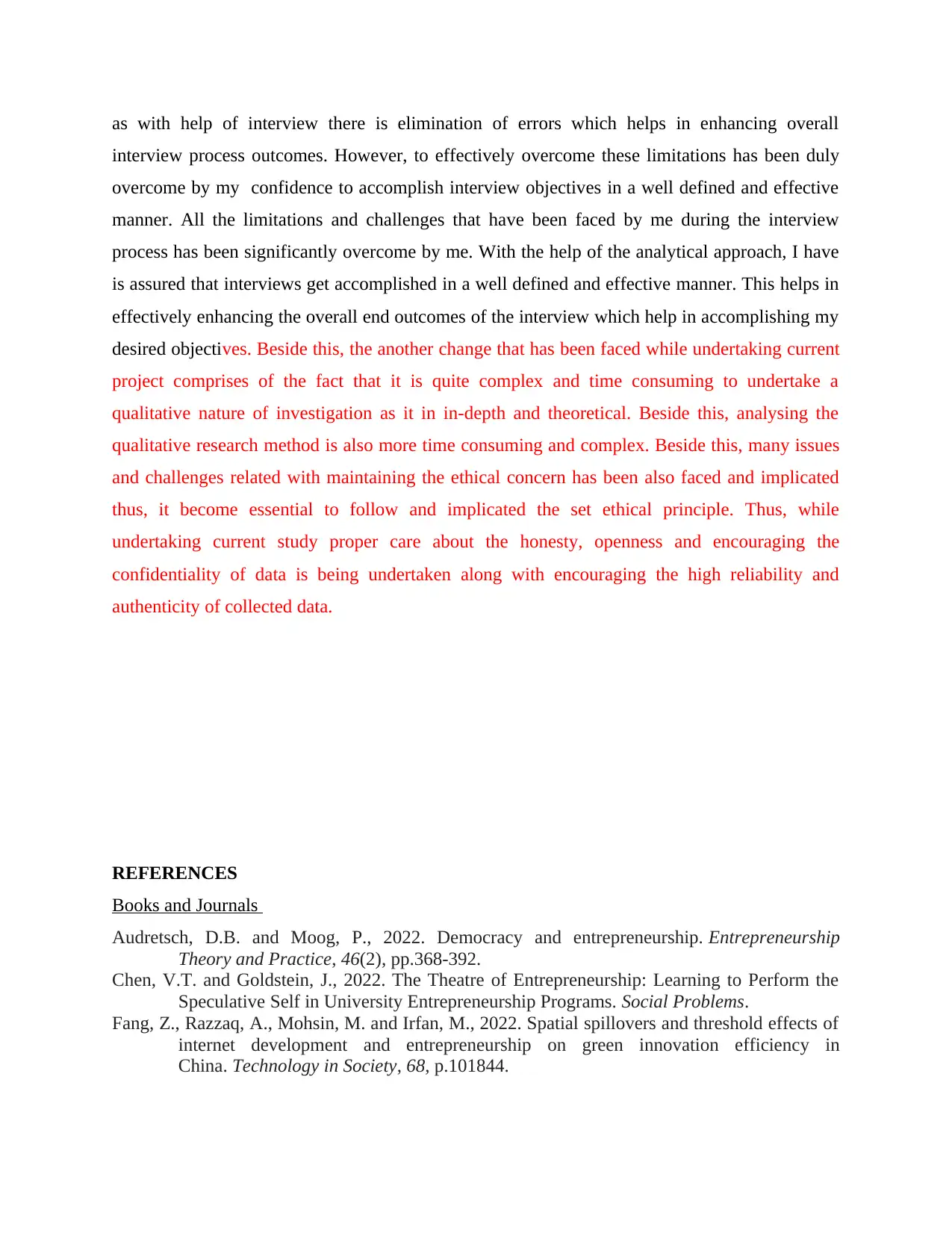
as with help of interview there is elimination of errors which helps in enhancing overall
interview process outcomes. However, to effectively overcome these limitations has been duly
overcome by my confidence to accomplish interview objectives in a well defined and effective
manner. All the limitations and challenges that have been faced by me during the interview
process has been significantly overcome by me. With the help of the analytical approach, I have
is assured that interviews get accomplished in a well defined and effective manner. This helps in
effectively enhancing the overall end outcomes of the interview which help in accomplishing my
desired objectives. Beside this, the another change that has been faced while undertaking current
project comprises of the fact that it is quite complex and time consuming to undertake a
qualitative nature of investigation as it in in-depth and theoretical. Beside this, analysing the
qualitative research method is also more time consuming and complex. Beside this, many issues
and challenges related with maintaining the ethical concern has been also faced and implicated
thus, it become essential to follow and implicated the set ethical principle. Thus, while
undertaking current study proper care about the honesty, openness and encouraging the
confidentiality of data is being undertaken along with encouraging the high reliability and
authenticity of collected data.
REFERENCES
Books and Journals
Audretsch, D.B. and Moog, P., 2022. Democracy and entrepreneurship. Entrepreneurship
Theory and Practice, 46(2), pp.368-392.
Chen, V.T. and Goldstein, J., 2022. The Theatre of Entrepreneurship: Learning to Perform the
Speculative Self in University Entrepreneurship Programs. Social Problems.
Fang, Z., Razzaq, A., Mohsin, M. and Irfan, M., 2022. Spatial spillovers and threshold effects of
internet development and entrepreneurship on green innovation efficiency in
China. Technology in Society, 68, p.101844.
interview process outcomes. However, to effectively overcome these limitations has been duly
overcome by my confidence to accomplish interview objectives in a well defined and effective
manner. All the limitations and challenges that have been faced by me during the interview
process has been significantly overcome by me. With the help of the analytical approach, I have
is assured that interviews get accomplished in a well defined and effective manner. This helps in
effectively enhancing the overall end outcomes of the interview which help in accomplishing my
desired objectives. Beside this, the another change that has been faced while undertaking current
project comprises of the fact that it is quite complex and time consuming to undertake a
qualitative nature of investigation as it in in-depth and theoretical. Beside this, analysing the
qualitative research method is also more time consuming and complex. Beside this, many issues
and challenges related with maintaining the ethical concern has been also faced and implicated
thus, it become essential to follow and implicated the set ethical principle. Thus, while
undertaking current study proper care about the honesty, openness and encouraging the
confidentiality of data is being undertaken along with encouraging the high reliability and
authenticity of collected data.
REFERENCES
Books and Journals
Audretsch, D.B. and Moog, P., 2022. Democracy and entrepreneurship. Entrepreneurship
Theory and Practice, 46(2), pp.368-392.
Chen, V.T. and Goldstein, J., 2022. The Theatre of Entrepreneurship: Learning to Perform the
Speculative Self in University Entrepreneurship Programs. Social Problems.
Fang, Z., Razzaq, A., Mohsin, M. and Irfan, M., 2022. Spatial spillovers and threshold effects of
internet development and entrepreneurship on green innovation efficiency in
China. Technology in Society, 68, p.101844.
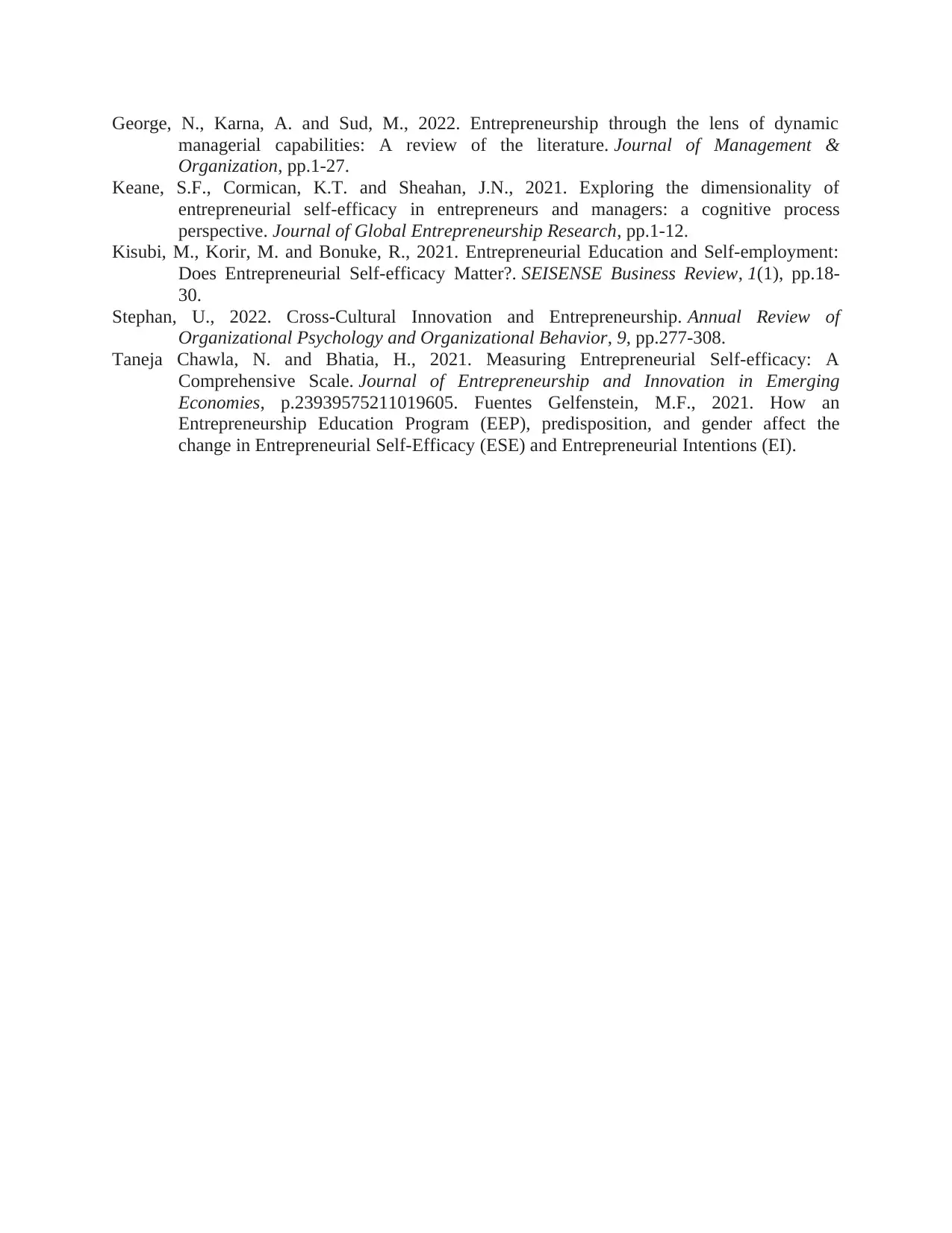
George, N., Karna, A. and Sud, M., 2022. Entrepreneurship through the lens of dynamic
managerial capabilities: A review of the literature. Journal of Management &
Organization, pp.1-27.
Keane, S.F., Cormican, K.T. and Sheahan, J.N., 2021. Exploring the dimensionality of
entrepreneurial self-efficacy in entrepreneurs and managers: a cognitive process
perspective. Journal of Global Entrepreneurship Research, pp.1-12.
Kisubi, M., Korir, M. and Bonuke, R., 2021. Entrepreneurial Education and Self-employment:
Does Entrepreneurial Self-efficacy Matter?. SEISENSE Business Review, 1(1), pp.18-
30.
Stephan, U., 2022. Cross-Cultural Innovation and Entrepreneurship. Annual Review of
Organizational Psychology and Organizational Behavior, 9, pp.277-308.
Taneja Chawla, N. and Bhatia, H., 2021. Measuring Entrepreneurial Self-efficacy: A
Comprehensive Scale. Journal of Entrepreneurship and Innovation in Emerging
Economies, p.23939575211019605. Fuentes Gelfenstein, M.F., 2021. How an
Entrepreneurship Education Program (EEP), predisposition, and gender affect the
change in Entrepreneurial Self-Efficacy (ESE) and Entrepreneurial Intentions (EI).
managerial capabilities: A review of the literature. Journal of Management &
Organization, pp.1-27.
Keane, S.F., Cormican, K.T. and Sheahan, J.N., 2021. Exploring the dimensionality of
entrepreneurial self-efficacy in entrepreneurs and managers: a cognitive process
perspective. Journal of Global Entrepreneurship Research, pp.1-12.
Kisubi, M., Korir, M. and Bonuke, R., 2021. Entrepreneurial Education and Self-employment:
Does Entrepreneurial Self-efficacy Matter?. SEISENSE Business Review, 1(1), pp.18-
30.
Stephan, U., 2022. Cross-Cultural Innovation and Entrepreneurship. Annual Review of
Organizational Psychology and Organizational Behavior, 9, pp.277-308.
Taneja Chawla, N. and Bhatia, H., 2021. Measuring Entrepreneurial Self-efficacy: A
Comprehensive Scale. Journal of Entrepreneurship and Innovation in Emerging
Economies, p.23939575211019605. Fuentes Gelfenstein, M.F., 2021. How an
Entrepreneurship Education Program (EEP), predisposition, and gender affect the
change in Entrepreneurial Self-Efficacy (ESE) and Entrepreneurial Intentions (EI).
1 out of 10
Related Documents
Your All-in-One AI-Powered Toolkit for Academic Success.
+13062052269
info@desklib.com
Available 24*7 on WhatsApp / Email
![[object Object]](/_next/static/media/star-bottom.7253800d.svg)
Unlock your academic potential
© 2024 | Zucol Services PVT LTD | All rights reserved.



